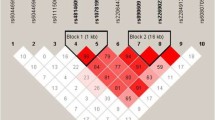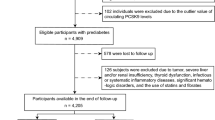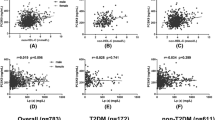Abstract
The rs7903146 polymorphism of TCF7L2 gene is known as the strongest genetic risk factor for type 2 diabetes mellitus (T2DM). The polymorphism is in association with clinical profile of T2DM patients. PCSK9 is a serine protease that promotes LDLR degradation and regulates circulating levels of lipids. The association of this polymorphism with PCSK9 and metabolic profile of diabetic and healthy subjects was investigated. This cross-sectional study was performed on 132 T2DM patients and the same number of healthy subjects. All the participants were genotyped for the rs7903146 single nucleotide polymorphism by the PCR-RFLP method. Metabolic profile including plasma levels of PCSK9, triglycerides, total cholesterol, non-HDL cholesterol, LDL cholesterol, HDL cholesterol, fasting plasma glucose, and HBA1C was measured. PCSK9, total cholesterol, and LDL-C levels were lower in the diabetic patients as compared to the healthy subjects. There were also direct and significant associations between PCSK9 and TG, TC, LDL-C, and non HDL-C in the subjects. Values of plasma glucose, HbA1c, PCSK9, TC, and LDL-C were higher in patients with TT genotype, but the differences were not statistically significant for all. A positive Spearman correlation was found between PCSK9 levels and the genotypes in all the participants. The results confirm the association of rs7903146 in the TCF7L2 gene with metabolic parameters and PCSK9. The T allele was associated with higher lipid and PCSK9 levels.

Similar content being viewed by others
References
Seidah NG, Prat A. The proprotein convertases are potential targets in the treatment of dyslipidemia. J Mol Med. 2007;85:685–96.
Kwon HJ, Lagace TA, McNutt MC, Horton JD, Deisenhofer J. Molecular basis for LDL receptor recognition by PCSK9. Proc Natl Acad Sci U S A. 2008;105:1820–5.
Nassoury N, Blasiole DA, Tebon Oler A, Benjannet S, Hamelin J, Poupon V, et al. The cellular trafficking of the secretory proprotein convertase PCSK9 and its dependence on the LDLR. Traffic. 2007;8:718–32.
Lambert G. Unravelling the functional significance of PCSK9. Curr Opin Lipidol. 2007;18:304–9.
Nozue T, Hattori H, Ogawa K, Kujiraoka T, Iwasaki T, Hirano T, et al. Correlation between serum levels of proprotein convertase subtilisin/kexin type 9 (PCSK9) and atherogenic lipoproteins in patients with coronary artery disease. Lipid Health Dis. 2016;15(1):165.
Abifadel M, Varret M, Rabès J-P, Allard D, Ouguerram K, Devillers M, et al. Mutations in PCSK9 cause autosomal dominant hypercholesterolemia. Nat Genet. 2003;34(2):154–6.
Li S, Guo YL, Xu RX, Zhang Y, Zhu CG, Sun J, et al. Plasma PCSK9 levels are associated with the severity of coronary stenosis in patients with atherosclerosis. Int J Cardiol. 2014;174:863–4.
Li JJ, Li YS, Fang CH, et al. Effects of simvastatin within two weeks on antiinflammatory cytokine interleukin 10 in patients with unstable angina. Heart. 2006;92:529e30.
Cohen JC, Boerwinkle E, Mosley TH Jr, Hobbs HH. Sequence variations in PCSK9, low LDL, and protection against coronary heart disease. N Engl J Med. 2006;354:1264–72.
Baass A, Dubuc G, Tremblay M, Delvin EE, O'Loughlin J, Levy E, et al. Plasma PCSK9 is associated with age, sex, and multiple metabolic markers in a population-based sample of children and adolescents. Clin Chem. 2009;55(9):1637–45.
Brouwers MCGJ, Troutt JS, van Greevenbroek MMJ, Ferreira I, Feskens EJ, van der Kallen C, et al. Plasma proprotein convertase subtilisin kexin type 9 is not altered in subjects with impaired glucose metabolism and type 2 diabetes mellitus, but its relationship with non-HDL cholesterol and apolipoprotein B may be modified by type 2 diabetes mellitus: the CODAM study. Atherosclerosis. 2011;217(1):263–7.
Lakoski SG, Lagace TA, Cohen JC, Horton JD, Hobbs HH. Genetic and metabolic determinants of plasma PCSK9 levels. J Clin Endocrinol Metab. 2009;94(7):2537–43.
Nekaies Y, Baudin B, Kelbousi S, Sakly M, Attia N. Plasma proprotein convertase subtilisin/kexin type 9 is associated with Lp(a) in type2 diabetic patients. J Diabetes Complicat. 2015;29(8):1165–70.
Yang SH, Li S, Zhang Y, Xu RX, Guo YL, Zhu CG, et al. Positive correlation of plasma PCSK9 levels with HbA1c in patients with type 2 diabetes. Diabetes Metab Res Rev. 2016;32(2):193–9.
Grant SF, Thorleifsson G, Reynisdottir I, Benediktsson R, Manolescu A, Sainz J, et al. Variant of transcription factor 7- like 2 (TCF7L2) gene confers risk of type 2 diabetes. Nat Genet. 2006;38:320–3.
Buraczynska M, Swatowski A, Markowska-Gosik D, Kuczmaszewska A, Ksiazek A. Transcription factor 7-like 2 (TCF7L2) gene polymorphism and complication/comorbidity profile in type 2 diabetes patients. Diabetes Res Clin Pract. 2011;93(3):390–5.
Sousa AG, Marquezine GF, Lemos PA, Martinez E, Lopes N, Hueb WA, et al. TCF7L2 polymorphism rs7903146 is associated with coronary artery disease severity and mortality. PLoS One. 2009;4(11):e7697.
Melzer D, Murray A, Hurst AJ, Weedon MN, Bandinelli S, Corsi AM, et al. Effects of the diabetes linked TCF7L2 polymorphism in a representative older population. BMC Med. 2006;20(4):34.
Warodomwichit D, Arnett DK, Kabagambe EK, Tsai MY, Hixson JE, Straka RJ, et al. Polyunsaturated fatty acids modulate the effect of TCF7L2 gene variants on postprandial Lipemia. J Nutr. 2009;139:439–46.
Levenson AE, Shah AS, Khoury PR, Kimball TR, Urbina EM, de Ferranti SD, et al. Obesity and type 2 diabetes are associated with elevated PCSK9 levels in young women. Pediatr Diabetes. 2017;18(8):755–60.
Miao J, Manthena PV, Haas ME, Ling AV, Shin DJ, Graham MJ, et al. Role of insulin in the regulation of proprotein convertase subtilisin/kexin type 9. Arterioscler Thromb Vasc Biol. 2015;35(7):1589–96.
Rangel SR, Araújo EM, de Matos EM, Carvalho G, Rios DLS. THE rs7903146 SNP of TCF7L2 gene and its association with the metabolic syndrome a review. Braz J Med Human Health. 2014;2(3):111–22.
Villareal DT, Robertson H, Bell GI, Patterson BW, Tran H, Wice B, et al. TCF7L2 variant rs7903146 affects the risk of type 2 diabetes by modulating incretin action. Diabetes. 2010;59:479–85.
Lyssenko V, Lupi R, Marchetti P, Del Guerra S, Orho-Melander M, Almgren P, et al. Mechanisms by which common variants in the TCF7L2 gene increase risk of type 2 diabetes. J Clin Invest. 2007;117(8):2155–63.
Costet P, Cariou B, Lambert G, Lalanne F, Lardeux B, Jarnoux AL, et al. Hepatic PCSK9 expression is regulated by nutritional status via insulin and sterol regulatory element-binding protein 1c. J Biol Chem. 2006;281(10):6211–8.
Jeong HJ, Lee HS, Kim KS, Kim YK, Yoon D, Park SW. Sterol-dependent regulation of proprotein convertase subtilisin/kexin type 9 expression by sterol-regulatory element binding protein-2. J Lipid Res. 2008;49:399–409.
Ibarretxe D, Girona J, Plana N, Cabré A, Ferré R, Amigó N, et al. Circulating PCSK9 in patients with type 2 diabetes and related metabolic disorders. Clin Investig Arterioscler. 2016;28(2):71–8.
Yang SH, Li S, Zhang Y, Xu RX, Zhu CG, Guo YL, et al. Analysis of the association between plasma PCSK9 and Lp (a) in Han Chinese. J Endocrinol Invest. 2016;39(8):875–83.
Wang S, Song K, Srivastava R, Fathzadeh M, Li N, Mani A. The protective effect of transcription factor 7-like 2 risk allele rs7903146 against elevated fasting plasma triglyceride in type 2 diabetes: a meta-analysis. J Diabetes Res. 2015;2015:468627.
Perez-Martinez P, Perez-Caballero AI, Garcia-Rios A, Yubero-Serrano EM, Camargo A, Gomez-Luna MJ, et al. Effects of rs7903146 variation in the Tcf7l2 gene in the lipid metabolism of three different populations. PLoS One. 2012;7(8):e43390.
Acknowledgements
This paper is part of M.Sc. thesis by Rohollah Yousefi. The authors wish to thank the Ahvaz Jundishapur University of Medical Sciences for financial support of the study.
Author information
Authors and Affiliations
Corresponding author
Ethics declarations
Conflict of interest
The authors declare that they have no conflict of interest.
Financial support
Financial support was provided by the Ahvaz Jundishapur University of Medical Sciences (Grant No. HRC-9308).
Human and animal rights
The study has been approved by the appropriate local ethics committee at the Ahvaz Jundishapur University of Medical Sciences (IR.AJUMS.REC.1395.76) and has been performed in accordance with the ethical standards as laid down in the 1964 Declaration of Helsinki and its later amendments or comparable ethical standards.
Ethical standard
All procedures performed in studies involving human participants were in accordance with the ethical standards of the Ahvaz Jundishapur University of Medical Sciences research committee and with the 1964 Helsinki declaration and its later amendments or comparable ethical standards.
Informed consent
Informed consent was obtained from all individual participants included in the study.
Rights and permissions
About this article
Cite this article
Yousefi, R., Mohammadtaghvaei, N., Zakerkish, M. et al. Association between plasma levels of proprotein convertase subtilisin/kexin type 9 (PCSK9) and lipids with rs7903146 polymorphisms of the TCF7L2 gene in diabetic patients. Int J Diabetes Dev Ctries 39, 380–386 (2019). https://doi.org/10.1007/s13410-018-0647-9
Received:
Accepted:
Published:
Issue Date:
DOI: https://doi.org/10.1007/s13410-018-0647-9




